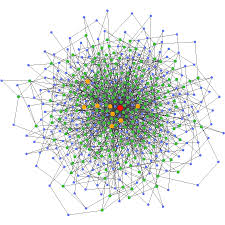The 80/20 Rule & Rich get Richer, Barabási, Albert-László
The first reading introduced the concept of the 80/20 rule, one which I had learnt in year 9 economics suggesting that 80% of a business’s sales are from 20% of their customers, and takes it further, applying it to numerous societal patterns. Some of which include 80% of decisions are made during 20% of meeting time, 80% of crimes are committed by 20% of criminals and 80% of customer service problems are created by 20% of customers.
It then went on to apply the rule to networks, although the numbers are slightly different; 80% of links on the web only point to 15% of webpages for example. To me this seems quite accurate. I mean, how many ads with hyperlinks do you see that direct you to Facebook, eBay, Apple etc? Compared to those of small, unnoticed webpages such as our blogs for example? I think if a comprehensive study were carried out, calculating all the webpages online and all the links to every webpage, the 80/20 (or 80/15) rule would be very close to the truth.
The second reading bought into context, how could you ever calculate how many webpages exist on the world wide web? It explains in terms of nodes, links, hubs, connectors etc, that the web started as a single node. And it eventually gets ‘linked’ to another node. All nodes are equal. Nodes can have many links to other nodes which are linked to several others and so on. The web is a network of nodes that is ever-increasing. Like my example last week about a spider-web, this reading helps put the foundation of the world wide web into comprehensive terms for me. See diagram below.

Recent Comments